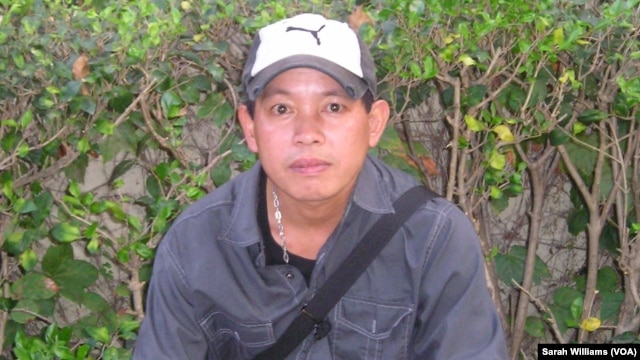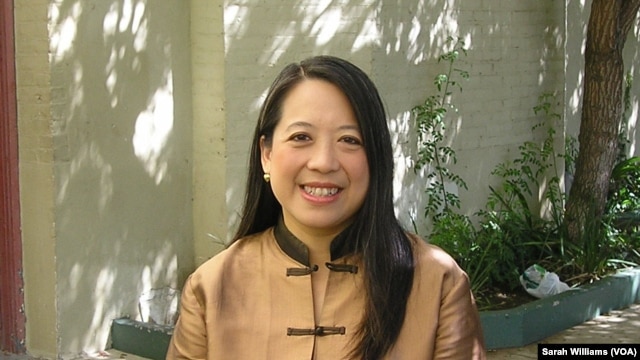Trafficked Thai Workers' Dreams Become Nightmares
by Sarah Williams, Voice of America News Feb 15, 2013
 Nopphon Fuchumpa was brought to the United States from Thailand with the promise of work by human traffickers
Nopphon Fuchumpa was brought to the United States from Thailand with the promise of work by human traffickers
In 2004, Nopphon Fuchumpa was promised a great opportunity in the United States.
The Thai laborer was told if he raised sufficient funds, he could travel to the U.S. and find work there. “They told me there are a lot of opportunities for work, especially work in farming,” he said.
What followed was a nightmarish saga that Fuchumpa said led to his being trafficked. He had to take out a loan for approximately $10,000 and hand over a deed for what he called his “ancestral land.” Then, he was told he had to supply an additional $10,000.
“First, I didn’t want to come (to the United Sates) because it’s such a large amount of money,” he said. “I paid half of it and I made the commitment to pay the other half. I kept thinking there would be a lot of opportunities to work in America, and I asked a recruiter, ‘Are you sure they’re real jobs there?’ And he said ‘Yeah, there are a lot of real jobs there. You’re halfway there, keep going.’”
Fuchumpa is one of more than 200 Thai workers involved in a legal case against Global Horizons Manpower Company, a labor contractor based in Los Angeles, California.
In September of 2010, agents working for the company were accused of luring farm workers to Hawaii from Thailand and mistreating them in what the FBI said is the largest human trafficking case ever charged in U.S. history.
The U.S. Justice Department dismissed charges of conspiracy to commit human trafficking against the company in the summer of 2012, saying the accusations could not be proved beyond a reasonable doubt. A civil case is still pending. Global Horizons has denied the charges, and did not respond to VOA’s request for an interview.
The financial impact on Fuchumpa has been lasting. In Thailand, Fuchumpa said he asked family members for help. He said his mother and sister-in-law helped by taking out additional loans.
When Fuchumpa arrived at the airport in Bangkok for his flight to the United States, he was warned that if he told anyone that he had paid the equivalent of $20,000 to make the trip, he would be sent back home.
In Los Angeles, the Thai Community Development Center has long been involved in trying to help people like Fuchumpa. The organization participated in the groundbreaking El Monte Trafficking case in 1995, when 72 thai women were found working in a sweatshop in Los Angeles County.
 Chanchanit Martorell, Thai Community Development Center, Los Angeles
Chanchanit Martorell, Thai Community Development Center, Los Angeles
Chanchanit Martorell, the executive director of the Center, said she sees mainly labor trafficking involving men, defying the common perception that trafficking usually affects women and girls.
“It has become a huge industry where everyone stands to profit from the recruitment and trafficking of Thai individuals, women, children and men, even your Thai grandmother in a village could get paid to find someone, and turn that person over to a trafficker,” she said.
When Fuchumpa arrived in the U.S., he was sent to pick apples on a farm in the northwestern state of Washington. When that ended, he was sent to Hawaii to work 10-hour days in brutal heat on a pineapple farm.
“The conditions were very harsh, especially the weather,” he said. “We had to pick up the pineapples directly under the sun, and we were told if we couldn’t do the job fast enough we would be sent back to Thailand.”
Another Thai worker, Amphon Kanthawang, said he was trafficked, and arrived in the U.S. in 2004. Like Fuchumpa, he had to pay about $20,000 to come to the U.S., where he initially worked on a North Carolina potato farm. When that assignment ended, he was sent also to Hawaii to pick pineapples.
“It was kind of like a military camp,” he said. “There was no direct pipeline that brought water to us...we had storage tanks…they had to ration the water, only so much to bathe yourself, and most importantly to drink and eat.”
For his part, Fuchumpa said the workers sometimes didn’t have enough to eat, and that some fainted in the fields.
“The workers had to wake up at four in the morning to get in line, there would be two long lines to get food early in the morning,” he said. “People who were at the end of the line, sometimes they didn’t even get food, you’d get a little box of maybe rice or something, it was barely enough to eat.”
The workers said they were also subjected to verbal abuse, and their employers would criticize them for not doing enough work, warning them they would be sent back to Thailand.
According to Martorell, such behavior is routine in trafficking cases. “The passports are confiscated, you’re left to live in a flophouse with no utilities, no running water, no furnishings, and then you’re guarded 24/7, not allowed to leave the premises, and you have no contact with the outside world, so your freedom has been completely stripped,” she said.
Most trafficking cases are discovered only because victims decide to take matters into their own hands and escape. Fuchumpa and his fellow workers met secretly on the pineapple farm, and vowed to meet one day in Los Angeles. “We said, ‘We have to go out and risk and die with the sword, or else we’ll have nothing left,’” he said.
Fuchumpa was sent from Hawaii to Fresno, California, where he was told he would be sent back to Thailand. He was able to phone a friend in Los Angeles, and the friend sent a taxi to collect him at an apartment complex in Fresno. Fuchumpa threw his belongings over a wall, climbed over the wall, and fled into the waiting taxi. He settled in Los Angeles, where he now works in construction, and hopes one day to return to Thailand on his own terms.
Kanthawang also fled his traffickers. He now lives in Los Angeles, and has worked in construction and in restaurants.
“Workers summon the courage and risk their lives, and their family’s lives, to escape because they couldn’t stand it anymore -- to be denied their freedom, and to be denied contact with the outside world and to be treated in the most inhumane way,” said Martorell.
She said trafficking exists in the open, yet its victims are hard to recognize,” said Martorell.
“It could be someone who is waiting on you at a Thai restaurant. They may appear to be completely free, but in fact, they’re not getting paid, “ she said. “In fact they’re being housed and not allowed to leave their housing.”
“They’re completely psychologically threatened, so even though they may be out in the open, serving food, they’re not going to escape because they’ve been so programmed,” Martorell added.
---30---